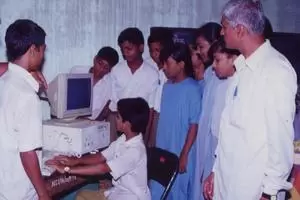Building a rural marketing database through computerisation

13-December-2010
Vol 1 | Issue 15
He has two aims. One, to provide computers to schools in 28,000 villages and two, to build a rural marketing database that can be used by big corporate houses to understand consumer behaviour. Meet 49-year-old Pradeep Lokhande, who gave up his marketing job and his own trading outfit to scour 4,000 odd villages for valuable information relating to local economy.
A self-made man, who did his graduation as a private student, - his family couldn’t afford him formal education - he is now familiar with villages in Maharashtra, Gujarat, Rajasthan, Uttaranchal, UP, MP, Chhattisgarh, Andhra Pradesh and Karnataka.
For, his Pune-based organisation, Rural Relations, has been working for almost 17 years to make the villages of India computer literate. While seeking to help students in the villages, his organisation also provides data relating to socio-economic conditions in the villages to various corporations.
 |
|
Pradeep Lokhande’s organisation ‘Rural Relations’ has donated free computers to about 3600 village schools in 3 States
|
Rural Relations collects information on the number of shops in a village, the name of the sarpanch, the number of television sets in the village and whether it has internet connectivity or not, and so on. “This data is used by many companies for their marketing and distribution purposes. The companies take a call with the data available as to whether the village is prosperous, and whether they would find consumers there for their product. For example if a village has about 10 shops they can make an estimate as to how much goods can be sold in that village,’’ he says.
Lokhande felt the need to take up the computer project when he realised that rural students will be left far behind in today’s competitive world if they are not introduced to computers at a young age, especially when their urban counterparts were using computers even as early as when they are five-years-old. “It was found that rural students do hear about computers right from their childhood (through television), but they do not get an opportunity to actually use the machine,’’ he says.
The first free computer was installed in Mandardevi village in Wai taluka of Satara district (Maharashtra) in the year 2001. It was impossible for Rural Relations to purchase computers for installation in all rural secondary schools. Hence, an appeal was made through local newspapers seeking donations of old discarded computers. These computers were obtained, repaired and then installed in rural schools of the choice of the donor.
“For better implementation of this scheme, we designed the NRV (Non-Resident Villager) Movement, which was targeted at those who had migrated to urban areas. We asked them to contribute towards the development of their village. We have installed 3,650 computers in 3,600 schools of 3600 villages in three States. With each of the schools having an average of 250 students, the scheme has since then benefited about 1,00,000 students,” he says.
Rural Relations has also begun the Gyan-Key library programme as part of its responsibility towards Indian villages. This has been started to inculcate the reading habit in both children and elders. As of today, about 395 gyan key libraries are operational reaching over to one lakh rural students.
















